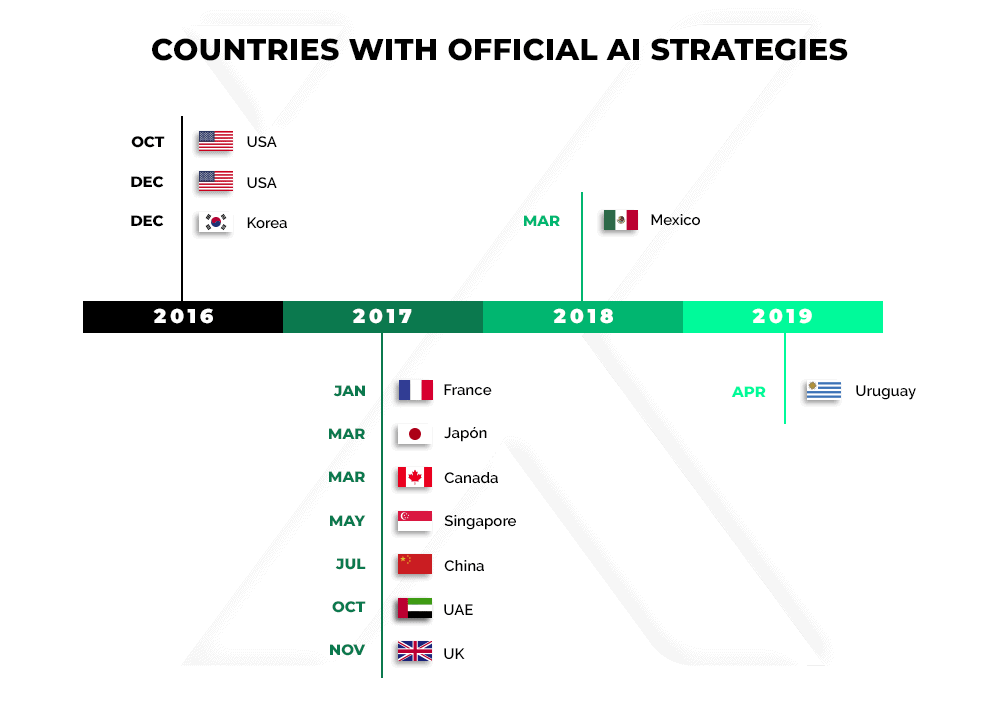
Por Carolina Zepeda
October 31, 2019
Contxto – Did you know that Mexico was the first Latin American country to launch a national AI strategy? As of 2018, its implementation in both the public and private sectors is an ongoing reality.
Some experts consider AI and its offshoots, machine learning and Big Data, a part of the “Fourth Industrial Revolution.” With their growing importance in practically every industry, incentives to evolve have also followed suit.
Of course, Latin America doesn’t want to be left behind. Even though AI is still emerging within the region, through its recent legislation, Mexico is leading the way.
The growing importance of AI in Latin America and around the world is certainly bringing about new opportunities. Yet it has also created new risks that need to be mitigated.
The incorporated use of AI in the public sector helps make governments more effective, transparent and improve the economy. However, for this to happen, governments must be prepared for its usage. Similar to Mexico’s fintech legislation, the country has created regulations for this emerging technology.
Most countries in Latin America don’t have policies or regulations for ethical AI use and its development. Nevertheless, Mexico is trying to set an example.
It’s important to keep in mind that Mexico is still a country in the development stage of new automation and technology adoption policies. According to the Automation Readiness Index, Mexico has a score of 75 out of 100 when it comes to startup support. Also, the country has a technology adoption score of 68.
Even though these numbers could improve, the country is progressing towards creating new technology policies. Being one of the first ten countries worldwide to launch an AI strategy proves it.

It all started with the report, Towards an AI Strategy in Mexico: Harnessing the AI Revolution commissioned by The British Embassy of Mexico. This study by Oxford Insights and C Minds addressed the growing AI market and benefits it could provide if applied to the public sector.
Then, in March of 2018, Mexico released its National AI Strategy. With this, it was the tenth country in the world to formalize its approach, not to mention the first in Latin America. All the same, the people of Mexico also wanted a say in how this technology was going to be rolled out.
Consequently, citizens, experts, startups and government agencies came together at the beginning of 2018 to form the AI2030 Coalition. As its name may suggest, the purpose of this partnership is to build an agenda for 2030 that promotes AI and its development throughout Mexico.

The AI2030 Coalition works “under a philosophy of shared responsibility between the government, academia, industries and citizens to ensure that Mexico isn’t left behind in the Fourth Industrial Revolution,” according to its site.
As planned, government-backed AI strategies were to spread beyond Mexico’s borders and into Latin America. Following suit, by April 2019, the government of Uruguay also deployed a road map for implementing artificial intelligence.
Even though most policies aim to implement the use of AI in the public sphere, the technology’s reach doesn’t stop there.
AI can reportedly increase productivity in a company by up to 40 percent. Therefore, it’s no surprise that industries like fintech, insurance, and digital marketing have adopted such strategies in Mexico.
The goal is to use data in order to simplify processes and improve risk assessments, all while garnering more effective decision-making. Over time, AI-powered solutions, data analysis and automation are shaping the way companies operate.
In this regard, innovation is key. Such a big task is already being tackled by Mexican startups like Yaydoo, FoodBot AI, Lefor, among many others.
Mexico is making headway towards the democratization of AI. Nevertheless, inequality between businesses, sectors and people is still a reality.
Technology like AI can be deployed by large entities such as transnational corporations. Albeit access might be more limited to SMEs or low-income individuals. As a result, there’s still a lot of ground to cover in order to enable AI-solutions for everyone.
It’s also important to note that the National AI Strategy was commissioned by the previous Head of State, Enrique Peña Nieto. Though now nobody knows how the current president, Andres Manual Lopez Obrador, will facilitate its implementation.
In that sense, continuity on behalf of the federal government is crucial. This is so considering that the creation of new policies is imperative to sustain the “AI momentum.”
-CZ

Por Stiven Cartagena
January 12, 2026